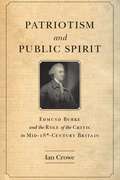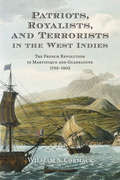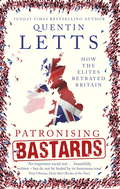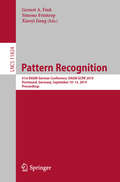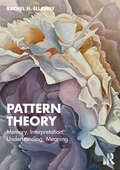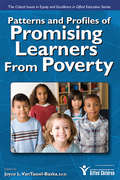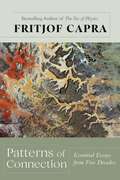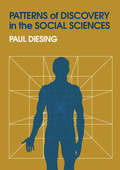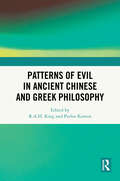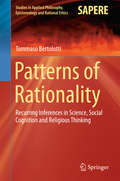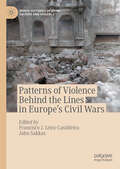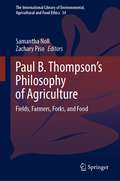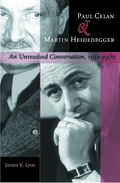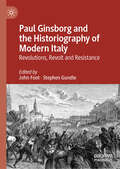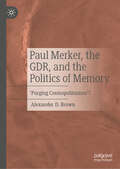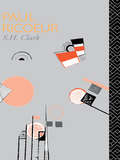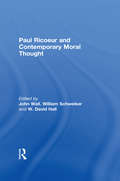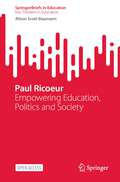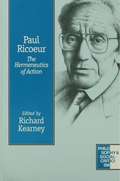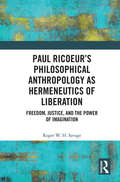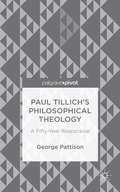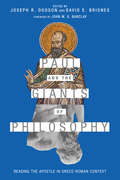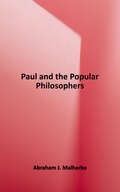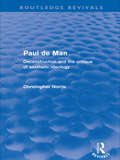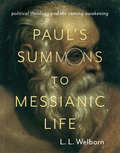- Table View
- List View
Patriotism and Public Spirit: Edmund Burke and the Role of the Critic in Mid-Eighteenth-Century Britain
by Ian CrowePatriotism and Public Spiritis an innovative study of the formative influences shaping the early writings of the Irish-English statesman Edmund Burke and an early case-study of the relationship between the business of bookselling and the politics of criticism and persuasion. Through a radical reassessment of the impact of Burke's "Irishness" and of his relationship with the London-based publisher Robert Dodsley, the book argues that Burke saw Patriotism as the best way to combine public spirit with the reinforcement of civil order and to combat the use of coded partisan thinking to achieve the dominance of one section of the population over another. No other study has drawn so extensively on the literary and commercial network through which Burke's first writings were published to help explain them. By linking contemporary reinterpretations of the work of Patriot sympathizers and writers such as Alexander Pope and Lord Bolingbroke with generally neglected trends in religious and literary criticism in the Republic of Letters, this book provides new ways of understanding Burke's early publications. The results call into question fundamental assumptions about the course of "Enlightenment" thought and challenge currently dominant post-colonialist and Irish nationalist interpretations of the early Burke.
Patriots, Royalists, and Terrorists in the West Indies: The French Revolution in Martinique and Guadeloupe, 1789-1802
by William CormackPatriots, Royalists, and Terrorists in the West Indies examines the complex revolutionary struggle in Martinique and Guadeloupe from 1789 to 1802. The arrival of tricolour cockades – a badge symbol of the French Revolution – and news from Paris in 1789 undermined the royal governors’ authority, unleashed bitter conflict between white factions, and encouraged the aspirations of free people of colour to equality and black slaves to freedom. This book provides a detailed narrative of the shifting political developments, and analyses the roles of planter resentment of metropolitan control, social and racial tensions, and the ambiguity of revolutionary principles in a colonial setting. Recent scholarship has tended to over-emphasize the colonies’ agency, and to accentuate the conflict between masters and slaves, while downplaying metropolitan influences. In contrast, this study seeks to restore the importance of destabilizing political struggles between white factions. It argues that metropolitan news, ideas, language, and political culture: the "revolutionary script" from France; played a key role in shaping the revolution in the colonies.
Patronising Bastards: How the Elites Betrayed Britain
by Quentin LettsFrom the Sunday Times bestselling author of 50 People Who Buggered Up Britain, Quentin Letts, comes his blistering new book on how Britain's out-of-touch, illiberal elite fills its boots.'HILARIOUS' Daily Mail'With its vicious takedowns, Quentin Letts' laugh-out-loud Patronising Bastards will have the lefty-elite running scared' The SunNot since Marie Antoinette said 'Let them eat cake' have the peasants been so revolting. Western capitalism's elites are bemused: Brexit, Trump, and maybe more eruptions to follow. But their rulers were so good to them! Hillary Clinton called the ingrates 'a basket of deplorables', Bob Geldof flicked them a V sign, Tony Blair thought voters too thick to understand the question. Wigged judges stared down their legalistic noses at a surging, pongy populous.These people who know best, these snooterati with their faux-liberal ways, are the 'Patronising Bastards'. Their downfall is largely of their own making - their Sybaritic excesses, an obsession with political correctness, the prolonged rape of reason and rite. You'll find these self-indulgent show-ponys not just in politics and the cloistered old institutions but also in high fashion, football, among the clean-eating foodies and at the Baftas and Oscars, where celebritydom hires PR smoothies to massage reputations and mislead, distort, twist. Political columnist and bestselling author Quentin Letts identifies these condescending creeps and their networks, their methods and their dubious morals. Letts kebabs them like mutton. It's baaaahd. It's juicy.Richard Branson, Emma Thompson, Shami Chakrabarti, Jean-Claude Juncker and any head waiter who calls you 'young man' - this one's for you!
Pattern Recognition: 41st DAGM German Conference, DAGM GCPR 2019, Dortmund, Germany, September 10–13, 2019, Proceedings (Lecture Notes in Computer Science #11824)
by Gernot A. Fink Xiaoyi Jiang Simone FrintropThis book constitutes the proceedings of the 41st DAGM German Conference on Pattern Recognition, DAGM GCPR 2019, held in Dortmund, Germany, in September 2019. The 43 revised full papers presented were carefully reviewed and selected from 91 submissions. The German Conference on Pattern Recognition is the annual symposium of the German Association for Pattern Recognition (DAGM). It is the national venue for recent advances in image processing, pattern recognition, and computer vision and it follows the long tradition of the DAGM conference series.
Pattern Theory: Memory, Interpretation, Understanding, Meaning
by Rachel H. EllawayPattern Theory is a groundbreaking exploration of the concept of pattern across a range of disciplines, including science, neuroscience, psychology, and social sciences.This book examines the meaning and implications of pattern, presenting a comprehensive body of theory that unifies concepts of form, order, and regularity and connects them to memory and perception. By challenging existing orthodoxies and linking evidence from brain and mind function, it outlines a robust theoretical framework around pattern searching and matching, pattern activation, and the continuity of pattern nexuses. This in-depth study of pattern theory and pattern thinking delves into the cognitive basis of patterns, their impact on reasoning and learning, and the social and collaborative nature of pattern recognition, expression, and representation. It also addresses philosophical issues and implications surrounding shared pattern thinking and introduces a broad conceptual basis for "pattern inquiry", providing a range of questions and methodologies for applying pattern theory. The book culminates in a manifesto for pattern theory and its application in pattern inquiry, offering 50 key principles that can be applied across various settings. Researchers, scholars, and practitioners are encouraged to explore and critique this unified theory as a lens for examining social and cognitive phenomena.Ideal for academics and professionals seeking to challenge their understanding of the connections between mind and society, as well as for those looking to deepen their understanding of pattern as a cognitive phenomenon, as a theoretical lens, and as a meta-methodology for inquiry, this text provides a substantive foundation for ongoing development and application of pattern science across multiple fields.
Patterns and Profiles of Promising Learners from Poverty
by Joyce Vantassel-BaskaPatterns and Profiles of Promising Learners From Poverty provides a comprehensive review of the issues surrounding the education and inclusion of promising students from poverty in gifted and talented programs.
Patterns of Connection: Essential Essays from Five Decades
by Fritjof CapraWinner of the Silver Medal for Environment/Ecology in the 2022 Independent Publisher (IPPY) Book AwardsFritjof Capra, scientist, educator, activist, and accomplished author, presents the evolution of his thought over five decades in Patterns of Connection. First introduced in the late 1950s to the work of Werner Heisenberg, a founder of quantum mechanics, Capra quickly intuited the connections between the discoveries of quantum physics and the traditions of Eastern philosophy—resulting in his first book, the bestselling The Tao of Physics. This synthesis, representative of the change from the mechanistic worldview of Descartes and Newton to a systemic, ecological one, went on to inform Capra&’s thinking about the life sciences, ecology, and environmental policy. His observations of sustainable communities in nature inspired his work on systems theory—the complex web of interrelated processes that organize everything from biological systems to social, cultural, and political systems.Today Fritjof Capra remains a major figure at the crossroads of physics, spirituality, environmentalism, and systems theory. Organized thematically and chronologically, the essays in Patterns of Connection document the revolutionary and far-reaching intellectual journey of one of the major public thinkers of the last half-century.
Patterns of Discovery in the Social Sciences
by Paul DiesingSocial scientists are often vexed because their work does not satisfy the criteria of "scientific" methodology developed by philosophers of science and logicians who use the natural sciences as their model. In this study, Paul Diesing defines science not by reference to these arbitrary norms delineated by those outside the field but in terms of norms implicit in what social scientists actually do in their everyday work.
Patterns of Evil in Ancient Chinese and Greek Philosophy
by Pavlos Kontos R.A.H. KingThe roots of evil are often held to be Biblical, but philosophers in ancient China and Greece were thoroughly conversant with both the phenomena and the languages of evil. This volume provides a comparative examination of patterns of evil in ancient Chinese and Greek philosophy.With no genealogical connections to rely on, the comparativist must establish a framework to connect these traditions. This volume utilizes the notion of "patterns" to address worries of methodological and ethical incommensurability, and to show what this means for the practice of comparative philosophy. In the case of evil, this methodology requires diving deep into the linguistic and political murk where evil lurks, with its deep roots in human dispositions for experience and action. The nine chapters are arranged in two parts. Those of Part I are written by scholars with a strong background in comparative philosophy and offer a substantial analysis of how both traditions respond to a specific aspect of the phenomenology of evil. Those of Part II are “twinned” chapters, that is, chapters that discuss similar topics in close dialogue with one another, but each does it from within either of these traditions. The volume is concluded with a reflection on the varieties of comparative strategies employed in the nine chapters.Patterns of Evil in Ancient Chinese and Greek Philosophy will appeal to scholars and graduate students interested in comparative philosophy, ancient Greek philosophy, early Chinese philosophy, and the problem of evil quite generally.
Patterns of Rationality
by Tommaso BertolottiThis book proposes an applied epistemological framework for investigating science, social cognition and religious thinking based on inferential patterns that recur in the different domains. It presents human rationality as a tool that allows us to make sense of our (physical or social) surroundings. It shows that the resulting cognitive activity produces a broad spectrum of outputs, such as scientific models and experimentation, gossip and social networks, but also ancient and contemporary deities. The book consists of three parts, the first of which addresses scientific modeling and experimentation, and their application to the analysis of scientific rationality. Thus, this part continues the tradition of eco-cognitive epistemology and abduction studies. The second part deals with the relationship between social cognition and cognitive niche construction, i. e. the evolutionarily relevant externalization of knowledge onto the environment, while the third part focuses on what is commonly defined as "irrational", thus being in a way dialectically opposed to the first part. Here, the author demonstrates that the "irrational" can be analyzed by applying the same epistemological approach used to study scientific rationality and social cognition; also in this case, we see the emergence of patterns of rationality that regulate the relationships between agents and their environment. All in all, the book offers a coherent and unitary account of human rationality, providing a basis for new conceptual connections and theoretical speculations.
Patterns of Violence Behind the Lines in Europe’s Civil Wars (World Histories of Crime, Culture and Violence)
by Francisco J. Leira-Castiñeira John SakkasThis edited collection examines the violence experienced by non-combatants during the civil wars which took place in Europe in the first half of the twentieth century. The determinants of violence in civil wars are highly complex and variable. By focusing on both the victims and perpetrators of violence in eight European countries, including Russia, Ireland, France and Spain, the book explores what happened when differing groups within a polity clashed, and in which ways internal conflicts manifested themselves and permeated societies. Divided into two parts, the chapters firstly identify and analyse how rearguard violence was produced and exercised during the European civil wars, and secondly, they examine the violence perpetrated by, and against, women. Shedding light on the violence that was inflicted upon European civilians in the early- to mid-twentieth century, this book presents insights for historians of Europe, political scientists, and international relations scholars alike.
Paul B. Thompson's Philosophy of Agriculture: Fields, Farmers, Forks, and Food (The International Library of Environmental, Agricultural and Food Ethics #34)
by Zachary Piso Samantha NollThis book explores the philosophical thought and praxis of Paul B. Thompson, who planted some of the first seeds of philosophy of agriculture and whose work inspires interdisciplinary scholarship in food ethics, biotechnology, and environmental philosophy. Landmark texts such as The Spirit of the Soil, The Agrarian Vision, and From Field to Fork revealed the fertility of food systems for inspiring reflection on our relationships to technology, the land, and one another. Rooted in philosophical traditions ranging from pragmatism to post-phenomenology, Thompson’s work nourishes projects in ethics, epistemology, philosophy of science, and social and political theory, not only in academic philosophy departments but also in the social and natural sciences. This volume collects this diversity of thought in a tour of the many fields of food systems; from theorizing the sustainability of agroecological systems, to appreciating the quotidian practice of agrarian communities, to anticipating the impacts of emerging biotechnology, and to savoring the roles that food plays in forming our identities. Composed by an international crop of scholars working on the future of food ethics, the volume is a vital contribution to scholars and practitioners thinking through our relationships to the food systems that sustain us.
Paul Celan and Martin Heidegger: An Unresolved Conversation, 1951–1970
by James K. LyonThis work explores the troubled relationship and unfinished intellectual dialogue between Paul Celan, regarded by many as the most important European poet after 1945, and Martin Heidegger, perhaps the most influential figure in twentieth-century philosophy. It centers on the persistent ambivalence Celan, a Holocaust survivor, felt toward a thinker who respected him and at times promoted his poetry. Celan, although strongly affected by Heidegger's writings, struggled to reconcile his admiration of Heidegger's ideas on literature with his revulsion at the thinker's Nazi past. That Celan and Heidegger communicated with each other over a number of years, and in a controversial encounter, met in 1967, is well known. The full duration, extent, and nature of their exchanges and their impact on Celan's poetics has been less understood, however. In the first systematic analysis of their relationship between 1951 and 1970, James K. Lyon describes how the poet and the philosopher read and responded to each other's work throughout the period. He offers new information about their interactions before, during, and after their famous 1967 meeting at Todtnauberg. He suggests that Celan, who changed his account of that meeting, may have contributed to misreadings of his poem "Todtnauberg." Finally, Lyon discusses their two last meetings after 1967 before the poet's death three years later. Drawing heavily on documentary material—including Celan's reading notes on more than two dozen works by Heidegger, the philosopher's written response to the poet's "Meridian" speech, and references to Heidegger in Celan's letters—Lyon presents a focused perspective on this critical aspect of the poet's intellectual development and provides important insights into his relationship with Heidegger, transforming previous conceptions of it.
Paul Ginsborg and the Historiography of Modern Italy: Revolutions, Revolt and Resistance
by John Foot Stephen GundleThis book brings together a group of British and Italian scholars who have made significant contributions to the historiography of modern Italy over the last three decades, dedicated to the influence of Paul Ginsborg. Reflecting Ginsborg's interest in the encounter of social and political history in modern Italy, contributions explore the varied forms taken by activism in civil society. Rather than just treating activism and engagement as limited, circumscribed phenomena within a political system, the essays consider these as interventions in the social. Taken together, the contributions gathered here highlight Ginsborg's contributions to scholarship and activism, as well as advancing our understanding of cultural change, institutional reform and the renewal of community in modern Italian history.
Paul Merker, the GDR, and the Politics of Memory: ‘Purging Cosmopolitanism’?
by Alexander D. BrownThis book presents ground-breaking research into the ‘Merker affair,’ a series of events that took place in the German Democratic Republic (GDR) in the early 1950s, which saw Paul Merker, a member of the ruling party’s ‘Politburo,’ become ensnared in the agent hysteria of the period. He was ultimately deposed, arrested, and convicted on charges of espionage. However, the cultural significance of this affair goes far beyond the history of the early Cold War; it has become the definitive symbol of alleged antisemitism in the GDR. The narrative complex of an antisemitic GDR has in turn become a prominent topos within the politics of memory in Germany. The author combines an empirical study of the pertinent primary sources with a genealogical analysis of discourse on the Merker affair in order to question and historicise many of the entrenched historiographical tropes surrounding it, and indeed broader subjects such as antifascism and antisemitism in a German context. In doing so, the book offers insight into how German state-mandated institutions and official bodies have shaped our collective vision of the past.
Paul Ricoeur (Critics of the Twentieth Century)
by Steven H. Clark"First Published in 1990, Routledge is an imprint of Taylor & Francis, an informa company."
Paul Ricoeur and Contemporary Moral Thought
by John Wall; William Schweiker; W. David HallThis book explores and proposes new avenues for contemporary moral thought. It defines and assesses the significance of the writings of French philosopher Paul Ricoeur for ethics. The book also explores what matters most to persons and how best to sustain just communities.
Paul Ricoeur: Empowering Education, Politics and Society (SpringerBriefs in Education)
by Alison Scott-BaumannThis open access book employs Paul Ricoeur's methodologies to identify, challenge, and replace with responsible language the many continuing abuses of power, including in the university curriculum and in the international discourse of right-wing populism. Using Ricoeur’s philosophy, the book provides a meta-frame for current debates about the university and a pragmatic micro-frame for supporting staff and students to develop important conversations on campus. It introduces the Community of Inquiry approach and describes its use to engage with complex ideas on which society has recently become silent. By contrasting Ricoeur’s work on Algeria and his work in Chicago, USA, .a bias blind spot is revealed in his desire for dialectical balance and reciprocity. This prevented him (and for some years the author) from accepting the connections between colonialism, slavery and racism and the urgent need for reparative justice. With Ricoeur, the readers can think differently: how to recognize and tackle racism and the democratic deficit, how to reduce epistemic injustice by learning how to speak out, how to move away from forced polarities and develop a pedagogy of hope as well as an acceptance of provisionality and the intractability of certain existential problems.
Paul Ricoeur: The Hermeneutics of Action (Philosophy and Social Criticism series #2)
by Richard M. KearneyPaul Ricoeur's work is of seminal importance to the development of hermeneutics, phenomenology and ideology critique in the human sciences. This major volume assembles leading scholars to address and explain the significance of this extraordinary body of work. Opening with three key essays from Ricoeur himself, the book offers a fascinating tour of his work ranging across topics such as the hermeneutics of action, narrative force, the other and deconstruction while discussing his work in the context of such contemporary figures as including Heidegger, L[ac]evinas, Arendt and Gadamer. Paul Ricoeur is also published as Volume 21 Issue 5/6 of Philosophy and Social Criticism.
Paul Ricoeur’s Philosophical Anthropology as Hermeneutics of Liberation: Freedom, Justice, and the Power of Imagination
by Roger W.H. SavageThis book offers a unique account of the role imagination plays in advancing the course of freedom’s actualization. It draws on Paul Ricoeur’s philosophical anthropology of the capable human being as the staging ground for an extended inquiry into the challenges of making freedom a reality within the history of humankind. This book locates the abilities we exercise as capable human beings at the heart of a sustained analysis and reflection on the place of the idea of justice in a hermeneutics for which every expectation regarding rights, liberties, and opportunities must be a hope for humanity as a whole. The vision of a reconciled humanity that for Ricoeur figures in a philosophy of the will provides an initial touchstone for a hermeneutics of liberation rooted in a philosophical anthropology for which the pathétique of human misery is its non- or pre-philosophical source. By setting the idea of the humanity in each of us against the backdrop of the necessity of preserving the tension between the space of our experiences and the horizons of our expectations, the book identifies the ethical and political dimensions of the idea of justice’s federating force with the imperative of respect. Paul Ricoeur’s Philosophical Anthropology as Hermeneutics of Liberation will be of interest to scholars and advanced students working in hermeneutics, phenomenology, ethics, political theory, and aesthetics.
Paul Tillich’s Philosophical Theology: A Fifty-Year Reappraisal
by George PattisonPaul Tillich's Philosophical Theology takes up the challenge as to whether his thought remains relevant fifty years after his death. In opposition to those who believe that his writings have little to say to us today, this book argues that his thought is largely exemplary of open theological engagement with the contemporary intellectual situation.
Paul and the Giants of Philosophy: Reading the Apostle in Greco-Roman Context
by Joseph R. DodsonWhat forces shaped the intellectual world of the apostle Paul? How familiar was he with the great philosophers of his age, and to what extent was he influenced by them? When he quoted Greco-Roman sources, what was his aim? Pauline scholars wrestle with such questions in journal articles and technical monographs, but now Paul and the Giants of Philosophy brings the conversation into the college classroom and the church. Each essay addresses Paul's interaction with Greco-Roman philosophical thinking on a particular topic, such as faith, slavery, gift-giving, and the afterlife. And each chapter includes discussion questions and reading lists to help readers engage the material further. Dodson and Briones have gathered contributors with diverse views from various traditions who are united in the desire to make Paul's engagement with ancient philosophy accessible to many readers.
Paul and the Popular Philosophers
by Abraham J. MalherbeThese studies continue a tradition of scholarship that flourished around the turn of the century when new editions of ancient philosophical sources were published. Professor Malherbe, however, widens the scope to include other philosophical traditions. <p><p>He recognizes and identifies the influences of Platonists, Peripatetics, Cynics, Stoics, Epicureans, and Pythagoreans. These popular philosophers aimed at moral reform; they shared both in their substance and in the techniques employed. Yet, they need to be distinguished in order to discern their influence, if any, on Paul.
Paul de Man: Deconstruction and the Critique of Aesthetic Ideology (Routledge Revivals)
by Christopher NorrisPaul de Man - literary critic, literary philosopher, "American deconstructionist" - changed the landscape of criticism through his rigorous theories and writings. Upon its original publication in 1988, Christopher Norris' book was the first full-length introduction to de Man, a reading that offers a much-needed corrective to the pattern of extreme antithetical response which marked the initial reception to de Man's writings. Norris addresses de Man's relationship to philosophical thinking in the post-Kantian tradition, his concern with "aesthetic ideology" as a potent force of mystification within and beyond that tradition, and the vexed issue of de Man's politics. Norris brings out the marked shift of allegiance in de Man's thinking, from the thinly veiled conservative implications of the early essays to the engagement with Marx and Foucault on matters of language and politics in the late, posthumous writing. At each stage, Norris raises these questions through a detailed close reading of individual texts which will be welcomed by those who lack any specialised knowledge of de Man's work.
Paul's Summons to Messianic Life
by L. L. WelbornTaubes, Badiou, Agamben, Žižek, Reinhard, and Santner have found in the Apostle Paul's emphasis on neighbor-love a positive paradigm for politics. By thoroughly reexamining Pauline eschatology, L. L. Welborn suggests that neighbor-love depends upon an orientation toward the messianic event, which Paul describes as the "now time" and which he imagines as "awakening." Welborn compares the Pauline dialectic of awakening to attempts by Hellenistic philosophers to rouse their contemporaries from moral lethargy and to the Marxist idea of class consciousness, emphasizing the apostle's radical spirit and moral relevance.
